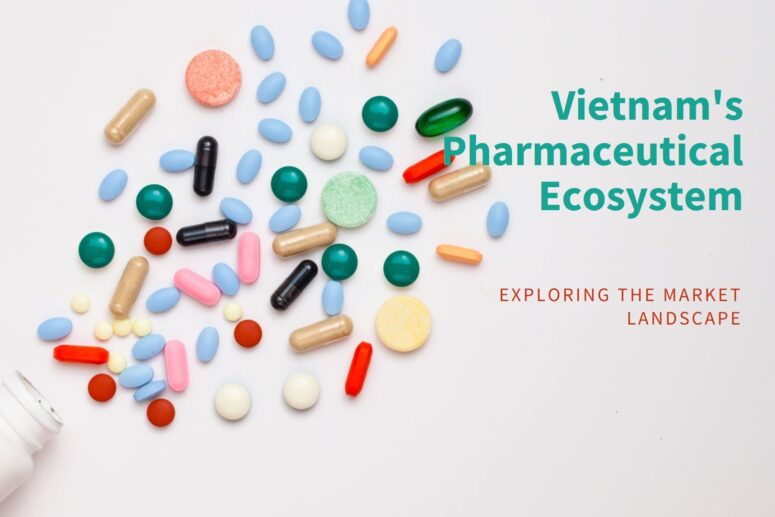
Market Overview
The Vietnamese pharmaceutical market is experiencing significant growth, driven by an expanding middle class, increasing healthcare expenditure, and rising demand for quality healthcare products. The market offers opportunities for both domestic and international pharmaceutical companies, focusing on generic drugs and increasing emphasis on research and development.
Ecosystem of Vietnam Pharmaceutical Market
With a population of over 98 million and a growing affluent class, Vietnam’s expenditure on medicines has risen significantly, showcasing its high paying capacity for healthcare. The country’s aging population further contributes to the demand for pharmaceutical drugs. To address these needs, the Vietnamese government has implemented healthcare reforms and initiatives to boost domestic pharmaceutical production. Specialty drugs are sought after to combat the increasing prevalence of chronic diseases like cancer and diabetes, providing better outcomes for patients.
Vietnam Pharmaceutical Market Analysis
- Vietnam’s growing affluent class and population of over 98 million have led to increased expenditure on medicines, reflecting a high paying capacity for healthcare.
- The country is undergoing a demographic shift, with an aging population expected to reach over 20% by 2038 and approximately 25% by 2049, further driving the demand for pharmaceutical drugs.
- The Vietnamese government has implemented proactive measures to enhance the healthcare system and pharmaceutical industry, including regulatory strengthening, streamlined drug registration processes, and support for domestic pharmaceutical production.
- Specialty drugs are in high demand due to the rising prevalence of chronic diseases like cancer and diabetes, offering targeted therapies and improved outcomes for patients amidst Vietnam’s epidemiological transition.
Key Trends by Market Segment
By Purchase Channel:
- Growing prevalence of chronic illnesses, such as cancer and cardiovascular diseases, boosts demand for affordable and easy-to-access generic formulations in Vietnam and, in turn, enhances generic drug consumption.
- Pharma companies invest heavily in developing new complex molecules targeting niche ailments that are now being treated using costly drugs and complex treatment procedures to overcome the generics cliff.
By Type of Drug:
- Generic drugs are developed using the same chemical composition as branded/approved small molecule therapy.
- Registered drug companies sell branded/innovator drugs under a registered brand name or trademark and are protected by a patent.
By Sales Channel:
- Hospital pharmacies play a vital role in supporting patient care by ensuring the availability of essential medications within the hospital. They collaborate closely with healthcare professionals to meet the specific medication needs of patients and provide specialised pharmaceutical services.
- Retail pharmacies offer convenience to customers by providing a wide range of pharmaceutical products in a retail setting. Customers can purchase medications and healthcare products without the need for a hospital visit. Retail pharmacies may provide consultation services to customers, offering advice on minor ailments, general health issues, and proper usage of medications.
Competitive Landscape
The competition landscape in the Vietnamese pharmaceutical market is characterised by a mix of domestic and international players. Major domestic companies include MWG, which entered the pharmaceutical market in 2018 with the establishment of its pharmaceutical retail brand, “Bach Hoa Xanh Drugstore.” Leveraging their extensive retail network and strong brand presence. Players like Sanofi and GSK have played significant roles in shaping the pharmaceutical market in Vietnam and have established themselves as leaders. Players like Domestic, DHG, Pymepharco, and Traphaco are involved in the manufacturing and distribution of a diverse range of pharmaceutical products. The market is highly competitive, with players competing based on product quality, pricing, distribution networks, and strategic partnerships. Additionally, the government’s initiatives to promote domestic production and reduce dependence on imports have further intensified competition in the market.
Recent Developments
- Vietnam is experiencing an increase in its elderly population due to improved life expectancy and declining birth rates. This demographic shift presents new challenges for the healthcare industry as there is an increased demand for specialised healthcare services for the elderly.
- In the face of a shortage of skilled labour, technology has become a potential solution to healthcare’s resource problems. For example, remote monitoring, medicine, and mobile devices will help doctors/medical staff to save physical consultation time.
- Lifestyle changes are driving up incidences of chronic diseases (diabetes, heart-related, cancers, etc.), increasing demand for chronic care. This is more costly and demands new models and considerations for the delivery of care.
- Consumers are demonstrating a lack of trust in traditional health systems due to several long-lasting and unsettled issues (e.g., overloading, long-time queuing, administrative issues, mistrust of medicine/inputs/quality of care, etc.).
Future Outlook
The Vietnam Pharmaceutical Industry is expected to grow at a CAGR of ~12% from 2022 to 2027, with government initiatives for infrastructure development expected to enhance connectivity within Vietnam.
- Vietnam has a large and rapidly growing population, with a median age of around 30 years. The rising population, along with increasing urbanisation and a growing middle class, creates a larger consumer base for pharmaceutical products.
- The Vietnamese government has been increasing its investment in healthcare infrastructure and services. This includes expanding access to healthcare facilities, improving healthcare quality, and enhancing the affordability of pharmaceutical products.
- The Vietnamese government has implemented policies and reforms to develop the pharmaceutical industry. This includes streamlining the drug registration process, improving intellectual property protection, and promoting local production of pharmaceuticals.
- The rising death rate from non-communicable diseases among the Vietnamese, along with the growing purchasing power, is expected to contribute to market growth over the forecast period.
Source: internet
